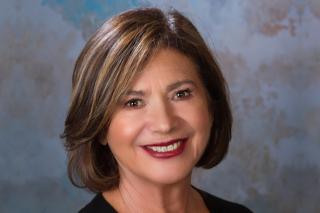Coming of age in the 1960s and 70s, Maria Karagianis witnessed tumultuous protests. As a staff writer for The Boston Globe, she covered desegregation in Boston, apartheid in South Africa, and Syrian refugees in the Greek islands. She is a Pulitzer Prize winner, a Woodrow Wilson Visiting Fellow, and founder of the non-profit organization Discovering Justice. A professor at Simmons inspired her career in journalism, and Karagianis believes that her Greek ancestry fueled her talent for storytelling. However, to achieve her goals, she also had to rebel against conventional Greek womanhood.
"One of the joys of my young life was going to my paternal grandmother's house in east Cambridge," recalls Maria Karagianis. "She sat in a rocking chair in the corner of the room, and would rock me in her arms." Her grandmother had grown up in a traditional Spartan village in which girls typically did not attend school. Despite her grandmother's illiteracy, Karagianis remembers her as a fantastic storyteller. "Grandmother sang to me in Greek, and told me many gripping stories about bravery, community, and togetherness. I loved these stories, and they led me to tell stories myself."
While Karagianis embraced her Greek ancestry, she rejected the domestic lifestyle of a conventional Greek woman. Like many traditional patriarchs of the mid-twentieth century, her father was adamant that his daughter forgo a college education and career in order to marry young and start having children. "At this time, my biggest rebellion was against my Greek father. I loved my Greekness, but I wanted to be my own person."
When Karagianis attended Simmons from 1966 to 1970, Boston was an epicenter of protest movements concerning civil rights, the Vietnam War, and women's rights. "It was a crazy but energizing time to be young. I was part of these movements, and I marched for a variety of causes," she reminisces.
A turning point in Karagianis' life came when she enrolled in a journalism course at Simmons taught by Professor Alden Poole, who was also the Editor at The Boston Herald Traveler (1825-1972). One day, Professor Poole asked to see Karagianis after class. "He pointed his finger right in my face, and said, ‘You are a writer.'" During her senior year at Simmons, Karagianis worked part-time for local papers, including the Brookline Chronicle-Citizen. In 1971, she became a reporter for The Boston Globe.
Working in a male-dominated newsroom in the 70s presented challenges. The Globe included a separate section called "The Woman's Page," for which Karagianis was expected to write dainty, apolitical stories about flower arrangements, debutante cotillions, and recipes. "But I had been a rebel and protestor, and I did not want to cover these issues," she says.
Karagianis got a break in 1973, when a federal order effectively de-segregated Boston public schools. "This caused violence like you would never believe, especially in white working-class neighborhoods," she recalls. Reporters from the Globe were permitted to refuse covering this event if they feared for their safety. As a result, Karagianis got on board. She worked on the desegregation coverage with a team of thirty writers and photographers. "There were riots, bombings, shootings — it was like covering a war," she says. Three years later, the team won a Pulitzer Prize gold medal for their superb coverage.
Karagianis went on to cover groundbreaking news abroad. One of her most memorable experiences as a reporter was covering apartheid in South Africa. "This was an amazing experience for me," she says. "Being in that kind of environment makes you appreciate democracy, however flawed it may be. I also learned how to talk to people with different points of view... It is important to understand how people arrive at certain conclusions, even if you disagree with them. These situations are always more complex than they seem."
After reporting for the Globe for nearly twenty years, Karagianis obtained a graduate degree from Harvard University and founded Discovering Justice, a non-profit organization that teaches youth about civic duty and democracy. In 2007, Karagianis' work caught the attention of a Harvard dean, who nominated her for a Woodrow Wilson Visiting Fellowship. Since then, Karagianis has served as Fellow, giving keynote lectures at numerous colleges and universities across the country.
During her fellowship, Karagianis has shared her perspective on the massive changes she has witnessed in the news industry over the course of her career. "In the old days, we would interview someone, and then interview several other sources and fact-check before publishing our news articles. We learned how to be objective and not to believe the first thing someone told us," she explains. "I would say that we all [including readers] have to be real journalists now. In other words, don't believe the first thing you hear, and always seek the facts."
Karagianis believes that it is much harder to be a journalist today. "But I would tell Simmons students to have courage and to try to move forward every day." Students should seize the opportunities, and never underestimate the power of luck.
"For me, meeting Professor Poole at Simmons was an amazing stroke of luck. He changed my life. This was a big thing for a working-class Greek girl. It gave me courage; if I could do this, I could do a lot of things. And as my grandmother used to remind me, ‘we are Spartans, and we never give up.' That is my motto."

